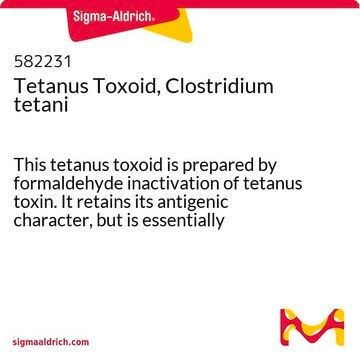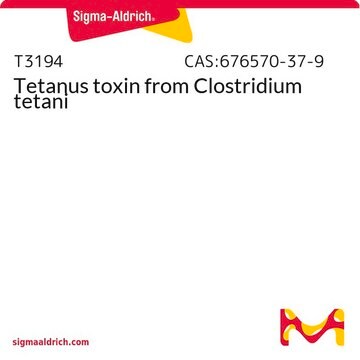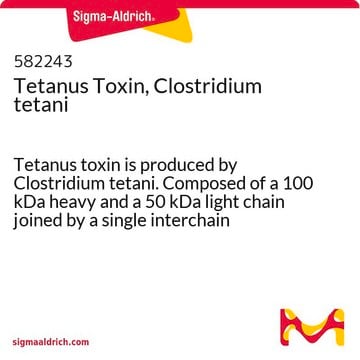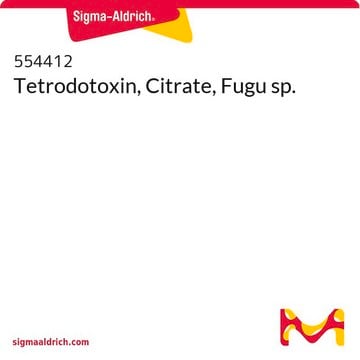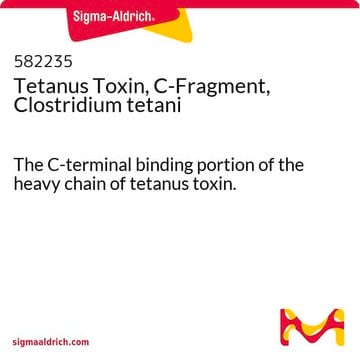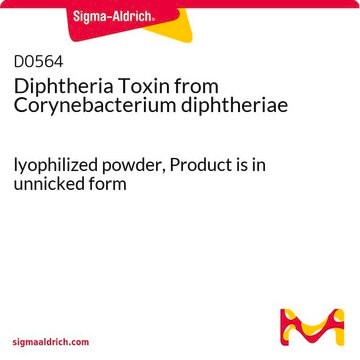T3694
Tetanus toxin C fragment from Clostridium tetani
Sinónimos:
TTC
Iniciar sesiónpara Ver la Fijación de precios por contrato y de la organización
About This Item
Productos recomendados
General description
Tetanus toxin C fragment (TTC) is a non-toxic peptide, which is transported from peripheral axons into spinal motoneurons. It provides protection for motoneurons (MN) in the spinal cord in vivo. TTC regulates membrane binding, internalization and retrograde transport within MN. It initiates neurotrophin-regulated signaling pathways in a Trk receptor-dependent manner. TTC has neuroprotective property in primary cerebellar granule cell culture.
Application
The C terminal binding portion of tetanus toxin is not toxic but is taken up by pre-synaptic nerve terminals and exhibits trans-synaptic retrograde transport in central neurons similar to that of tetanus toxin. It is used to map neuronal connections and to target proteins to neurons.
Biochem/physiol Actions
Tetanus toxin is a neurotoxin that comprises of a heavy and a light chain linked by disulfide bridges. This neurotoxin enters the cytoplasm and releases the light chain component that subsequently inhibits the release of neurotransmitters2. Studies have reported that the fragment C of tetanus toxin retains most of the determinants that interact with thyroid membranes, gangliosides and neural membranes3.
Reconstitution
Each vial, when reconstituted with 50 μl of sterile distilled water, contains 10 μg of tetanus toxin C-fragment in 0.01 M sodium phosphate, pH 7.5. To aid recovery, 0.1% albumin may be added.
signalword
Danger
hcodes
Hazard Classifications
Acute Tox. 1 Oral - Acute Tox. 2 Inhalation - STOT SE 1
target_organs
Central nervous system
Storage Class
6.1A - Combustible acute toxic Cat. 1 and 2 / very toxic hazardous materials
wgk_germany
WGK 3
flash_point_f
Not applicable
flash_point_c
Not applicable
Certificados de análisis (COA)
Busque Certificados de análisis (COA) introduciendo el número de lote del producto. Los números de lote se encuentran en la etiqueta del producto después de las palabras «Lot» o «Batch»
¿Ya tiene este producto?
Encuentre la documentación para los productos que ha comprado recientemente en la Biblioteca de documentos.
Los clientes también vieron
Tetanus toxin C-fragment protects against excitotoxic spinal motoneuron degeneration in vivo
Netzahualcoyotzi C and Tapia R
Scientific Reports, 8(1), 16584-16584 (2018)
E Link et al.
Biochemical and biophysical research communications, 189(2), 1017-1023 (1992-12-15)
Tetanus toxin is a potent neurotoxin that inhibits the release of neurotransmitters from presynaptic nerve endings. The mature toxin is composed of a heavy and a light chain that are linked via a disulfide bridge. After entry of tetanus toxin
T B Helting et al.
The Journal of biological chemistry, 252(1), 187-193 (1977-01-10)
Tetanus toxin was digested with papain, yielding one major polypeptide (Fragment C) with a molecular weight corresponding to 47,000 +/- 5%, thus comprising about one-third of the toxin molecule. Fragment C was antigenically active, atoxic, and stimulated the formation of
Interaction of fragments B and C of tetanus toxin with neural and thyroid membranes and with gangliosides.
N P Morris et al.
The Journal of biological chemistry, 255(13), 6071-6076 (1980-07-10)
Nuestro equipo de científicos tiene experiencia en todas las áreas de investigación: Ciencias de la vida, Ciencia de los materiales, Síntesis química, Cromatografía, Analítica y muchas otras.
Póngase en contacto con el Servicio técnico